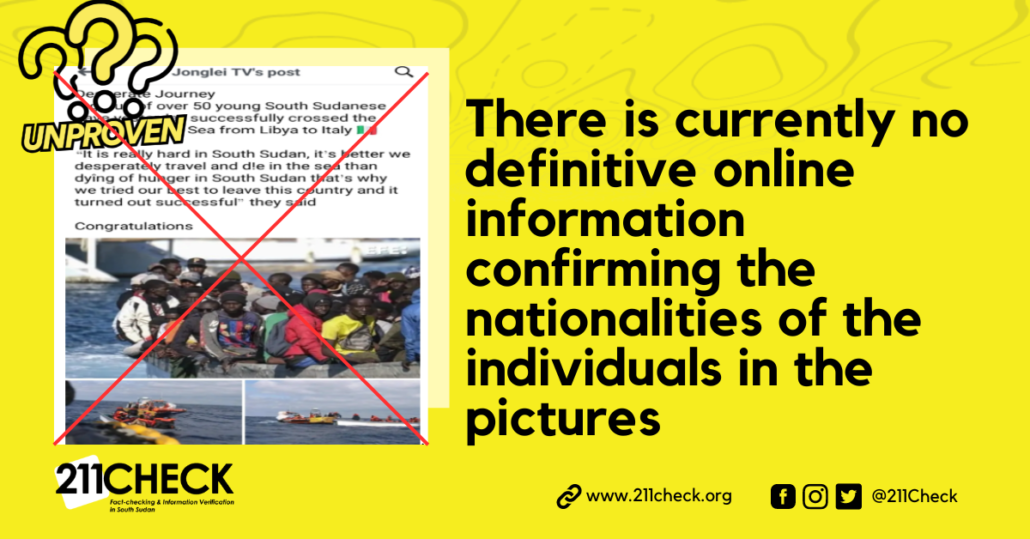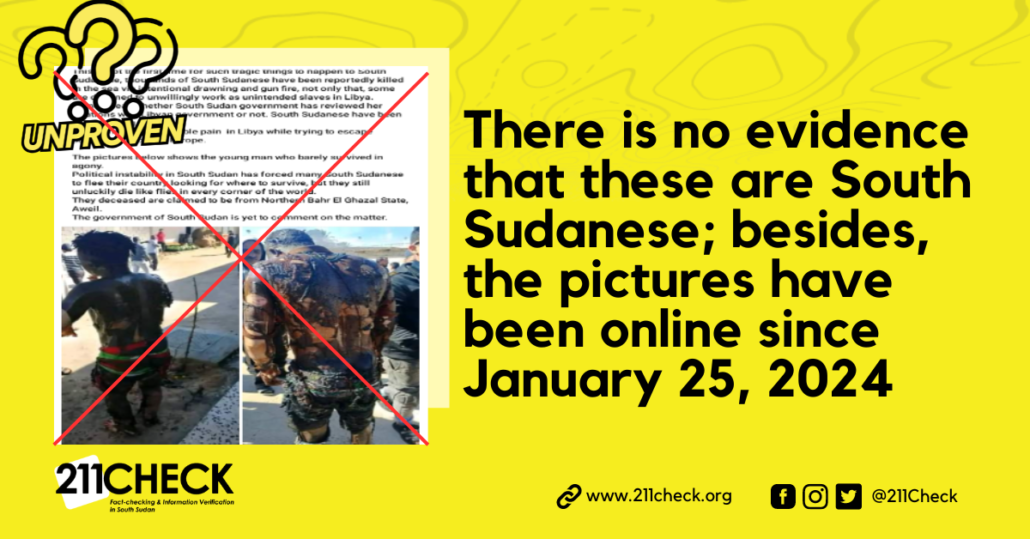Fact-check: No evidence these pictures show South Sudanese immigrants
These pictures, allegedly of South Sudanese immigrants, have been online since January 2, 2024, but no publicly available information tells the nationalities of the people in them.
Writer: Jibi Moses
Some images making the rounds on social media claiming to be of South Sudanese immigrants arriving in Italy through Libya are unproven.
The pictures, which accompanied an article by Jonglei TV on March 4, 2024, claimed the pictures were of South Sudanese who had just arrived in Italy after escaping the harsh conditions back home.
“Desperate Journey. A group of over 50 young South Sudanese have successfully crossed the Mediterranean Sea from Libya to Italy yesterday,” the post partly reads.
A screenshot of the post by Jonglei TV.
Claim Verification:
211 Check verified the images individually to establish whether the pictures depict South Sudanese fleeing the economic conditions back home.
Picture One:
A reverse image search result for the first image showed several instances where the image was used. Several online news outlets used the image in their stories with different headlines, some dating back to January 4, 2024.
InfoMigrants, which describes itself as… Migrant News is a news website designed to combat misinformation that migrants may fall victim to, whether in their country of origin, on their journey, or in the country where they hope to build a new life. To target the largest possible audience, Migrant News is available in six languages: French, Arabic, English, Dari, Pashto, and Bengali. Published a story on January 4 with the headline, “Nearly 250 migrants arrive on the Canary Islands in one day.”
A screenshot of the picture used by the InfoMigrants newspaper.
Other news agencies that reported on the story are seen here, here, here, and here.
Picture Two and Three:
A reverse image search also shows several articles published with the picture, among other similar ones with different headlines. These ranged from mainstream online publications to social media handles like X (formerly Twitter).
An X (formerly Twitter) user retweeted a tweet first shared by MSF Sea.
MSF Sea tweeted, “37 people on an overcrowded fibreglass boat were rescued this morning by the #MSF team while on its way to #Bari. They reported being at sea for at least four days. They were really weak & are now receiving medical care on board.”
The screenshot of the pictures used by MSF Sea
Desperate Journeys and Immigrants:
In 2018, the UNHCR, the United Nations agency responsible for refugees, produced a Desperate Journeys report. In this report, they explained the trends of these journeys. In 2018, they observed that the number of immigrants dropped, but this could have been due to reduced rescue missions and changes in the routes in the sea used by the immigrants to avoid being intercepted and brought. This, in the long run, makes many cases go unreported.
“The number of refugees and migrants making the Mediterranean Sea crossing fell in 2018. Still, likely, reductions to search and rescue capacity coupled with an uncoordinated and unpredictable response to disembarkation led to an increased death rate as people continued to flee their countries due to conflict, human rights violations, persecution, and poverty,” UNHCR.
Since then, many immigrants from African countries have been making attempts to illegally enter Europe in a bid to escape the harsh political and economic conditions in their home countries. Unfortunately, many of them don’t make it, as these journeys are not only dangerously long, where some die of hunger, thirst, and dangerous waves in the sea, but also illegal.
The media has a lot of content about these journeys, both positive and negative, and these are some of them: here, here, here, here, here, and here.
The search for better economic prospects drives many African migrations; they believe in better opportunities and living conditions in Europe.
Conclusion:
211 Check found insufficient information to show that the pictures making the rounds are of South Sudanese immigrants. Besides, the same pictures have been online since January 2, 2024.
To ensure accuracy and transparency, we at 211 Check welcome corrections from our readers. If you spot an error in this article, please request a correction using this form. Our team will review your request and make the necessary corrections immediately, if any.
It’s vital to fight misinformation and disinformation in the media by avoiding fake news. Don’t share content you’re uncertain about. False information can harm and mislead people, risking their lives—Fact-check before sharing. For more details, visit https://211check.org/ or message us on WhatsApp at +211 921 350 435. #FactsMatter.



